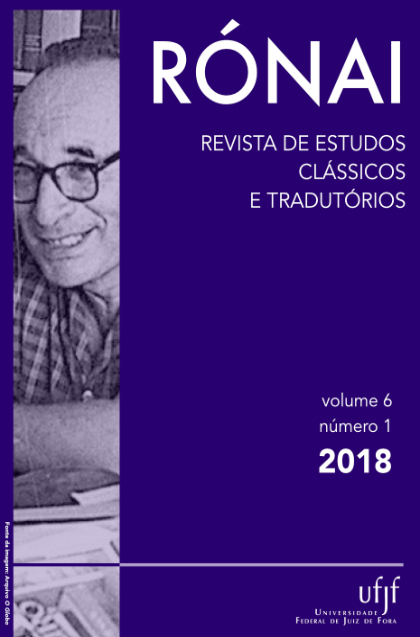The challenges involved in translating latin "agronomical" texts
DOI:
https://doi.org/10.34019/2318-3446.2018.v6.23237Keywords:
agronomical literature, translation, challenges, Cato, VarroAbstract
In this article, we explore some of the challenges involved in translating Roman agrarian texts. These challenges correspond to translating into the target language the specificities of the language, lexicon and style of the “agronomists”. The analysis mode corresponded to a brief examination of the lexicon and the style in works such as Cato’s De agri cultura and Varro’s De re rustica, sometimes in comparison with the same aspects found in the Georgics. At last, we infer that, despite the particularities found in these “agronomical” treatises, the concerns about form and content have to integrate, as in the translation of other types of texts, the horizons of their translators.
Downloads
References
ARMENDÁRIZ, J.-I. G. Agronomía y tradición clásica: Columela en España. Sevilla: Universidad de Cádiz/Universidad de Sevilla, 1995.
CATÃO. Da agricultura. Trad., introdução e notas de Matheus Trevizam. Campinas: Unicamp, 2016.
DE MEO, C. Lingue techniche del latino. Bolonha: Pàtron, 1986.
FUNARI, P. P. Considerazioni sull’anfora e la terminologia latina dei vasi recipienti. Santiago: Universidad Metropolitana de Ciencias de la Educación, 2000.
GAFFIOT, F. Dictionnaire latin-français. Paris, Hachette, 1934.
GALE, M. Didactic epic. In: HARRISON, S. (org.). A Companion to Latin literature. Malden, MA/Oxford, England/Carlton, Victoria, Australia: Blackwell Publishing, 2005, p. 101-115.
HEURGON, J. “Introduction”, in Varron. Économie rurale – Livre I. Texte établi et trad. par J. Heurgon. Paris: Les Belles Lettres, 2003, p. VII-LXXXV.
MESCHONNIC, H. Poética do traduzir. Trad. Jerusa Pires Ferreira e Suely Fenerich. São Paulo: Perspectiva, 2010.
MOISÉS, M. Dicionário de termos literários. São Paulo: Cultrix, 2011.
PALMER, L. R. The Latin language. Norman/London: University of Oklahoma Press, 1988.
RÓNAI, P. Escola de tradutores. Rio de Janeiro: José Olympio, 2012.
de SAINT-DENIS, E. Syntaxe du latin parlé dans les “Res rusticae” de Varron. Revue de Philologie, Paris, année et tome XXI, p. 141-62, 1947.
SARAIVA, F. R. S. Novíssimo dicionário latino-português. Rio de Janeiro/Belo Horizonte: Garnier, 1993.
TILL, R. La lingua di Catone. Trad. di Cesidio De Meo. Roma: Edizoni dell’Ateneo, 1969.
TREVIZAM, M. Prosa técnica: Catão, Varrão, Vitrúvio e Columela. Campinas: Unicamp, 2014.
VÄÄNÄNEN, V. Introduction au latin vulgaire. Paris: Klincksieck, 1981.
VARRÃO. Das coisas do campo. trad., introd. e notas de Matheus Trevizam. Campinas: Unicamp, 2012.
VIRGIL. Georgics: vol. I – books 1-2. Edited by R. F. Thomas. Cambridge: Cambridge University Press, 1994.
Downloads
Published
How to Cite
Issue
Section
License
Copyright (c) 2018 Matheus Trevizam

This work is licensed under a Creative Commons Attribution 4.0 International License.
Copyright
The authors of the published contributions agree with the following items:
1. The authors keep the copyright and convey to the journal the right of first publication, the work being licensed under a Creative Commons Attribution License 4.0 International.
2. The authors are allowed and stimulated to publicize and distribute their work online after the publication in the journal, recognizing first publication in this journal.
3. The authors of the approved works authorize the journal to distribute their content, after publication, for reproduction in content indexes, virtual libraries and similars.
For more information about Creative Commons Attribution License 4.0 International, please, go to: https://creativecommons.org/licenses/by/4.0/deed.en
Editorial exemption
The authors of the published contributions are entirely and exclusively responsible for their contents. Its content does not represent an official position of Rónai - Revista de Estudos Clássicos e Tradutórios neither of Faculdade de Letras da Universidade Federal de Juiz de Fora or their partner institutions.



